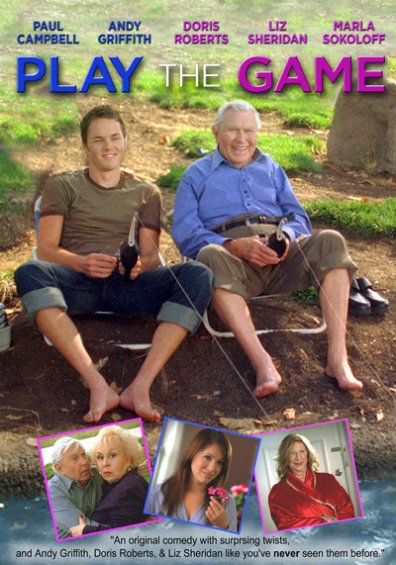Interview: Marc Fienberg of ‘Play the Game’
Posted on August 27, 2009 at 2:00 pm
“Play the Game” has many elements that are often found in sexy romantic comedies — a hero who thinks he does not want to fall in love and a heroine who teaches him that he does not know what he wants, a pair of couples whose romantic ups and downs complement and balance each other, and the usual comic mis-fires before the happily-ever-after ending. But it also has some very unusual elements: the sexy humor about the romances of the elderly and the fact that the important relationship in the film is between a devoted grandfather and grandson. Another surprise: the grandfather making the Viagra jokes is played by Andy Griffith. 
The movie’s title comes from the games played by the main characters in order to maintain control of their romantic relationships.
So I began my interview with writer-director Marc Fienberg by asking him about the worst game he ever played during his dating days.
It was a trick that appears in the movie, “planned spontaneity,” arranging a chance encounter, or what looks like a chance encounter, even though you planned it out meticulously.
I tried to seduce my wife for seven years. Some might call it stalking — any other woman would have called the police. I drove up to Madison after four years and told her I was in town for a consulting gig, even though I was there just to see her. It didn’t work. My friends who helped me develop these tricks of the trade, it worked like a charm for them. I wish I was as suave and debonair as the guy in the movie.
So, despite the “planned spontaneity” ploy, it is not autobiographical?
It is not so much autobiographical, as a reflection of my life. In my case, only three years later, I just put it on the line and told the truth. I took my own advice and it actually worked. Lying in general is not good.
So I’ve heard! It was nice to see Clint Howard in this film, and of course he has that connection to Andy Griffith going back to his guest appearances with his brother Ron Howard on the old “Andy Griffith Show.”
Clint Howard was the first actor to sign on board. I always wanted him for this part. We had actually gone out to Andy Griffith but he said no at first. We were on a short schedule and he worried that he didn’t have time to learn his lines. And he was concerned about the sex scenes. He is a religious man and he wanted to be consistent with his values. But he said he couldn’t stop thinking about it. The bedroom scene showed older people in a nice, honest, realistic light. And very important — he didn’t die in it. There are not a lot of parts for older characters that don’t have them dying at the end. This movie was all about passion and living life to the fullest and holding out hope that there’s love and companionship at all ages and he liked that.
Griffith and many of your other actors have a television background — Liz Sheridan on “Seinfeld,” Doris Roberts on “Everybody Loves Raymond,” Marla Sokoloff (“The Practice”). Was it an adjustment to work on a feature film?
TV and movies are similar enough from an actor’s standpoint. It’s always hard but the actors brought something even I didn’t see.
What’s next?
“The Machine,” more of a family comedy about a young goat herder who dreams of doing bigger things with his life. Then the internet comes to town and he is forced to save his village. I’m also working on another romantic comedy and doing commercials now, too.
How did your own family influence this story?
My grandfather started dating when he was 89 years old. The more time I spent with him, the more I appreciated different things in life and what was important. When you see these vibrant, passionate lives you more easily focus on what matters in the world.
My father was my first inspiration. He was a closet writer. And I had teachers and read authors who have inspired me to follow my passion. Giving up a safe, secure career, the hardest part was taking that leap to a career that had enjoyment and fulfillment and could make the world a better place. I studied business and started a million dollar e-commerce company that got sold. I wanted to make people laugh, affect people. One of the main things that gave me strength was my kids. It was important to have them see me doing something fulfilling, to set an example for them. We realized that our concern about the financial risk of trying to make a career in movies affected me and my wife much more than the kids.
In the movie, the father is the bad influence and grandfather is the good influence. It was when he started working for his father that he started being less honest. And it is when he starts trying to teach his grandfather not to be honest with women that he learns how important honesty — with himself and others — really is.

